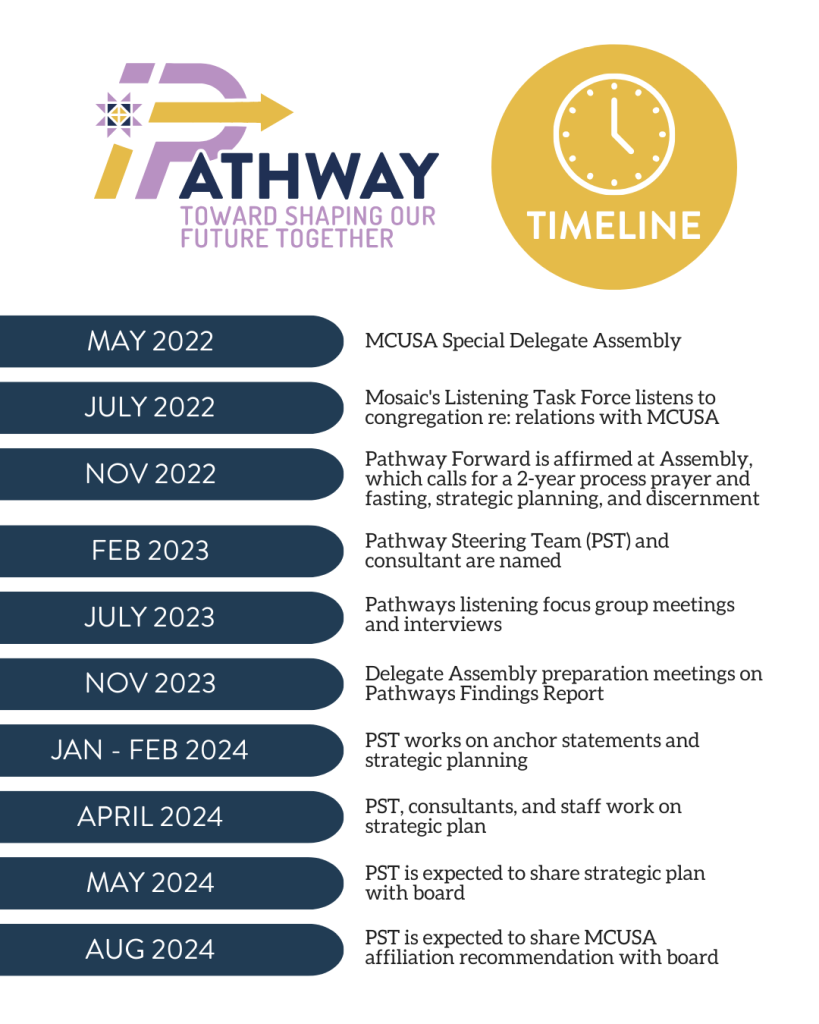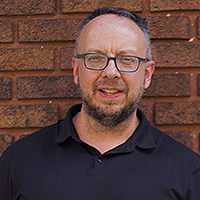by Stephen Kriss
In November 2022, our Mosaic delegate body met for the first time in person. And we had our first shared crisis of identity. Mennonite Church USA’s (MC USA) Kansas City summer 2022 special delegate session, which included repealing the denomination’s membership guidelines and passing a Repentance and Transformation resolution, created ripples of emotion for many persons across Mosaic.
In response, at our first annual face-to-face, Mosaic delegates affirmed the Pathway Forward which includes strategic planning (needed at this point in our story together), an option for congregations to remove themselves from MC USA, and a promised discernment about our relationship with MC USA as a Conference community. This was a lot for the first annual face-to-face session.
This is a lot for a new community to bear in its beginning. However, we are both deeply rooted and freshly new. By the grace and lovingkindness (chesed) of God, we have continued to flourish with surprising growth and provision in this two-year period. Our board has led with steadiness and our member congregations have engaged in mutuality and the agreed-upon work of our core missional, formational and intercultural priorities as we seek to embody the reconciling love of Jesus in our broken and beautiful world.
In these two years, the Pathway Steering Team, which represents the diversity of gifts and perspectives of our Conference, has diligently worked on strategic planning and is moving closer to discernment on a recommended path for our Mosaic affiliations.
In the meantime, Mosaic staff and board have made sure the work of the Conference continues. For me, as Executive Minister, this has meant understanding our relationship and responsibilities with MC USA and the implications of remaining within the denomination or finding alternative paths.
Last month, I shared with the Pathway Steering Team three possible pathways I can identify for our future as Mosaic:
A Pathway of Autonomy
As someone of Slavic descent, I recognize that autonomy can present new possibilities and challenges. Franconia Conference has been an autonomous conference in the past. Our community has capacity, in human and financial resources, to operate autonomously. We would still be Mennonites. We would find new ways to relate to other Anabaptists. We would seek membership in Mennonite World Conference. I have explored possible affiliations outside of MCUSA, and from my perspective, none would fit who we are or give us the support and space we need to live into our vision and mission.
A Pathway of Continued Commitment
When Mosaic formed, we assumed continued membership in MC USA. We have deep connections broadly across the church and our continued engagement would offer our strength, diversity, and perspective to the largest Mennonite group in the U.S. Our membership in MC USA gives access to resources that are important in our credentialing process and in supporting some of our most vulnerable and newest communities with grants for ministry, educational opportunities, and financial backing for the purchase of new meetinghouses. Continued membership would maintain those programmatic connections and relationships across the country. The challenge for some of us is that this affiliation has become a liability rather than a strength that enables us to live more fully into our vision and mission.
A Pathway of Collaboration or Partnership
At the last MC USA gathering, Mennonite Health Services and Everence altered their relationships with MC USA. We have had some initial conversations with leaders in MCUSA on what a different relationship might look like, in which we could collaborate on some areas of shared interest while holding our own polity and membership guidelines as Mosaic. This would require something new for MC USA (timely, given that we just discussed reinventing the church at our annual Constituency Leadership Council [CLC] gathering). This would also require something of us in Mosaic. Is it possible that Mosaic is a better MC USA partner rather than full member? Would this allow us to live into our vision and mission more fully?
I have committed to a sense of holy indifference as the Executive Minister of Mosaic. I can see strengths and vulnerabilities in each of these paths. And it’s possible that the Pathway Steering Team will offer an alternative recommendation.

What I do expect is that a year from now, Mosaic will be a different community in some way. This may be difficult, and it may also be invigorating. So far, the Spirit has continued to show up. I am committed to us living into our vision and mission of embodying the reconciling love of Christ even in difficult circumstances together. We won’t get it right all the time, but I want to keep us focused on living into who we have felt God has called us to be, both broken and beautiful.
The Pathway Steering Team will likely have the strategic plan ready for board review at the May meeting at Bethany Birches Camp in Vermont. We hope there will be a recommendation for the board regarding affiliation at the August meeting. Conference delegates will have an opportunity to discuss this in our Assembly preparation gatherings, as we prepare for further discernment at the November 2, 2024, annual Assembly at Souderton (PA) Mennonite Church.
As the pathway emerges, may we have the courage to do what is right and good, may we extend God’s great chesed to all, and may we walk humbly as individuals and as a Mosaic community.

Stephen Kriss
Stephen Kriss is the Executive Minister of Mosaic Conference.
